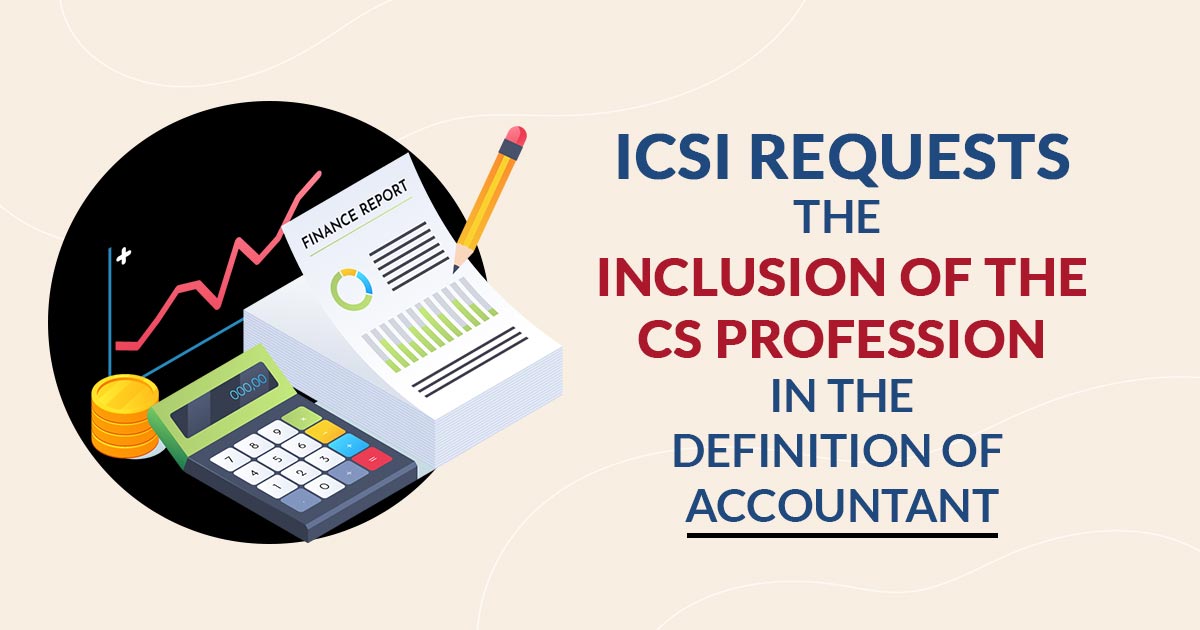
The Institute of Company Secretaries of India (ICSI) has asked to seek the inclusion of the profession of Company Secretary’ within the definition of the Company Secretaries Act, 1980 in the definition of “Accountant” provided u/s 515(3)(b) of the Income Tax Bill 2025.
ICSI is a premier professional body established under an Act of Parliament, the Company Secretaries Act, 1980, to regulate and develop the profession of Company Secretaries.
A Company Secretary is a highly skilled professional who receives extensive training from the Institute of Company Secretaries of India (ICSI) through in-depth study, examinations, rigorous training, and continuing professional development programs. After obtaining a certificate of practice from the ICSI, a Company Secretary in practice can provide various certification and audit services, including internal, concurrent, and secretarial audits.
ICSI Submission
As you are aware, the ecosystem of taxation laws in India has undergone significant changes due to recent amendments. The new Income Tax Bill of 2025 is a roadmap to support India’s vision of becoming a $5 trillion economy by 2027 and a developed nation by 2047. In this regard, ICSI, as a pioneer in facilitating adequate governance, has been actively partnering in different initiatives with the Government of India.
The Union Budget for 2025-26 focuses on four key engines of growth: Agriculture, Micro, Small, and Medium Enterprises (MSMEs), Investment and Exports, and transformative reforms. These initiatives aim to stimulate growth across various sectors, including manufacturing, IT, services, and MSMEs, all of which require skilled professionals to help transform India into a developed country.
Additionally, industries and businesses need more qualified professionals for taxation and compliance purposes. This shift will reduce dependency on any single profession and foster a competitive, quality-driven tax ecosystem. It is particularly important to meet these requirements in Tier 2 and Tier 3 cities.
There is a need to expand the availability of professionals to ensure timely tax filings, reduce compliance bottlenecks, and avoid repeated tax filing extensions. This will benefit both businesses and the government.
Read Also: What is the Future Scope for Chartered Accountants
It is important to highlight that Company Secretaries as experts in corporate and tax laws furnish valuable interpretations and ensure regulatory compliance, thereby enhancing tax governance. Allowing Company Secretaries to engage in tax practices will expand the pool of professionals available to businesses, particularly in smaller cities. Therefore, we kindly request that you consider including the profession of Company Secretaries in the definition of “Accountant” as outlined in Section 515(3)(b) of The Income Tax Bill, 2025.
It has been a pending problem for a long period to include the Company Secretary at par with the other professional in the meaning of “accountant”. Concerning that we need to draw your attention to various Reports of the Parliamentary Standing Committee wherein it was suggested/recommended by the Committee to retain other professionals in the description of accountant.
The Company Secretaries have been allowed to issue distinct certifications and conduct tax audits under various legislations furnished via distinct authorities which is attached as Annexure I.
The curriculum of the Company Secretaryship Course comprises an inter-alia, detailed study of Direct Taxation, Indirect Taxation, and Financial Accounting as under:
CS Tax Professional Schedule
- Goods and Services Tax (GST) and Corporate Tax Planning [Group 2, Paper 7.2]
CS Executive Programme
- Tax Laws and Practice [Group 2 Paper 7]
- Corporate Accounting and Financial Management [Group 1 Paper 4]
Therefore broader exposure is been furnished before the Company Secretaries in the areas of taxation and accounts allowing them to acquire proficiency in taxation and other related subjects.
After passing the Professional Programme examination, the students of the Company Secretaryship Course would be required to undergo the compulsory training of the Corporate Leadership Development Programme (CLDP).
CLDP also comprises training on Goods and Services Tax (GST) and Practical Aspects of Direct Taxes. The below-mentioned certificate courses in taxation areas have been owned by the Insitute for its members allowing them to acquire practical information in taxation.
- Certificate Course on GST.
- PMQ Course on Direct Taxes (Post Membership Diploma).
- Certificate Course on Corporate Tax and VAT in UAE.
Concerning diverse recognitions available for the Company Secretaries and the detailed coverage of the Accounting and Taxation papers in the curriculum of the Company Secretaryship Course, it is proposed that Company Secretaries are very well conversant with the technicalities of the accountancy and taxation and are at par with other professionals.
Under the aforementioned, we request your good self to include the profession of ‘Company Secretary’ within the meaning of the Company Secretaries Act, 1980 in the Definition of “Accountant” given under Section 515(3)(b) of The Income-Tax Bill, 2025 which may read as under:
“Accountant” means a chartered accountant as defined in section 2(1)(b) of the Chartered Accountants Act, 1949, who holds a valid certificate of practice under section 6(1) of that Act, or a company secretary as defined in section 2(1)(b) of the Company Secretaries Act, 1980, who holds a valid certificate of practice under Section 6 (1) of that Act, or any person having such qualifications as the Board may prescribe, for the purposes established in this behalf.









